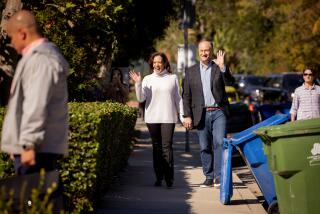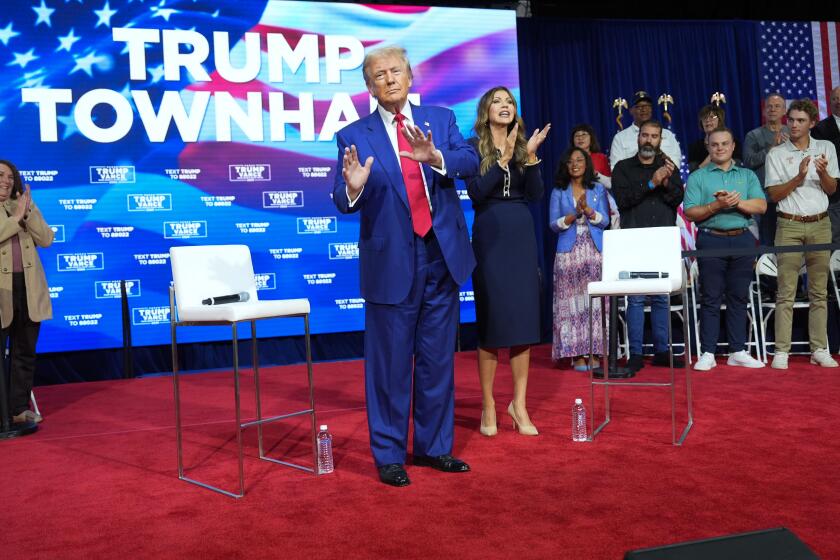CALIFORNIA ELECTIONS / U.S. SENATE : Herschensohn Sees Crime at Root of Riots
Republican U.S. Senate nominee Bruce Herschensohn said that people who rioted in Washington after the 1968 assassination of Martin Luther King Jr. were “happy” and not reacting out of anger or rebellion--a situation he said was akin to the 1992 Los Angeles riots.
In his first post-primary appearance, Herschensohn said Wednesday night the Washington riots illustrate that the cutback of Great Society anti-poverty programs during the Reagan Administration had nothing to do with the Los Angeles unrest. Democratic President Lyndon B. Johnson’s Great Society was flourishing in Washington in 1968, he noted.
Arson, looting and other crimes associated with both disturbances were criminal acts and not a form of social rebellion or protest, the conservative Los Angeles commentator said.
“I was in Washington, D.C., on April the 4th of 1968 when the tragedy of the assassination of Martin Luther King was announced in that city,” Herschensohn told a dinner meeting of metal-finishing industry representatives in the City of Commerce.
“And there was a terrible riot in that city. And it was rioting by people who were happy--they weren’t crying, people who were happy--they weren’t angry. They were throwing stones at windows and they were taking out television sets and stereo sets and it was so akin to the kind of thing we saw recently (in Los Angeles).”
Herschensohn noted that the Washington riots came near the end of the Johnson Administration, which launched many of the war-on-poverty programs designed to elevate social conditions of the urban poor in the mid-1960s.
“That is real important,” Herschensohn said. “The Great Society programs were flourishing and flourishing in Washington, D.C., for sure, which is a federal government enclave. . . . You blame the people who are criminals in something like this. There were people underfed next door to people who were out looting and burning and murdering. You blame the people who did it--period. You don’t blame a political entity.”
Throughout May, Herschensohn voiced objections to the argument that the frustration and despair of poor people erupted into rebellion. Critics argued that reductions in domestic urban programs during the Reagan years led to, or contributed to, such frustration and despair.
The issue prompted little dispute between Herschensohn and Rep. Tom Campbell of Stanford, his major opponent in the GOP primary for the six-year Senate term to succeed Democrat Alan Cranston. That is certain to change as Herschensohn engages in the general election campaign with Rep. Barbara Boxer of Marin County, a liberal who said on May 1: “It is time to pick up the pieces of shattered dreams born of 12 years of Reagan-Bush domestic neglect.”
On Wednesday, Boxer accused the Bush Administration of further contributing to the problem:
“The President should have supported measures to combat the hopelessness in our cities, which is clearly due to a 60% cut in urban aid since Ronald Reagan became President in 1981, and since that time federal aid for states and cities was cut by $78 billion while the Pentagon budget was increased by $579 billion.”
At the metal-finishers’ dinner, the riot issue arose after Herschensohn was asked to comment on federal taxing and spending. He said those decisions should be made at the local level whenever possible and added, “I despise the idea of the federal government coming in with funds after the riots.”
Herschensohn said that the outpouring of voluntary assistance provided “a great sense of community that I haven’t seen in a long time in Los Angeles,” but that “went down the tubes” as soon as the federal government stepped in.
In Washington, Boxer told the House that passage of adequate aid for the cities “will take new leadership, or a veto-proof Democratic Congress, because what we get today is blaming Lyndon Baines Johnson for the trouble in the cities, blaming Murphy Brown for the trouble in the cities and blaming each other for the trouble in the cities. That won’t cut it.”
Some conservatives have argued that anti-poverty programs actually worsened conditions of the urban poor, but Herschensohn said he did not hold Johnson responsible for any rioting.
In brief opening remarks, Herschensohn accused environmental leaders, whom he did not name, of pursuing a socialist course.
“They do not like private property. They do not like private enterprise. They do not like capitalism. They like socialism,” he said.
Herschensohn added that he did not believe that members of Congress and bureaucrats who promulgate environmental laws and rules are particularly sympathetic with socialism, but, “I think they are in love with power.”
More to Read
Get the L.A. Times Politics newsletter
Deeply reported insights into legislation, politics and policy from Sacramento, Washington and beyond. In your inbox three times per week.
You may occasionally receive promotional content from the Los Angeles Times.










